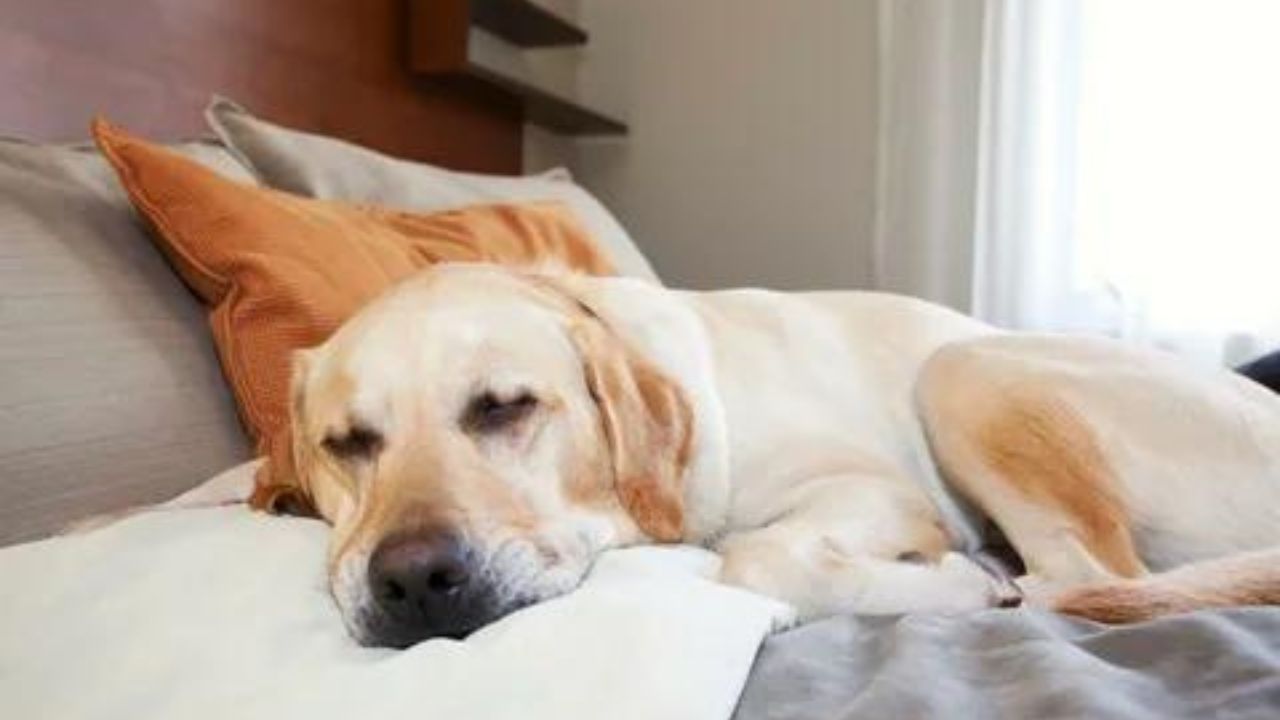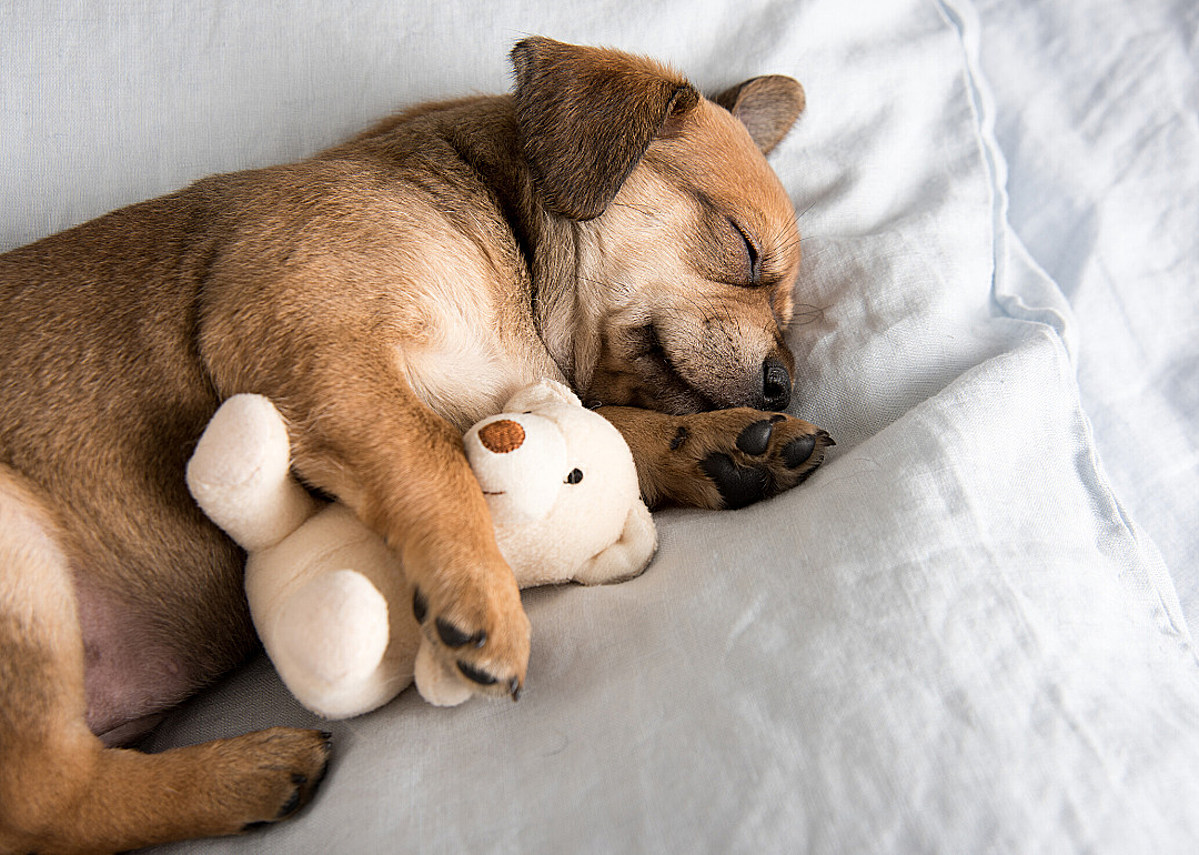
Welcome to the wonderful world of being a new puppy parent! You’ve got a brand new furry friend and want to ensure they have the best start in life. One of the most important things you can do for your new pup is to establish a consistent puppy’s sleep routine.
Just like babies, puppies need plenty of rest to grow and develop properly. But, if you’ve ever had a new puppy, you know that getting them to sleep through the night can be a challenge. Whether your puppy is a light sleeper, has separation anxiety, or is just full of energy, establishing a sleep routine can be a lifesaver for you and your furry friend.
In this article, we’ll share our top tips on establishing a sleep routine for your puppy. We’ll cover everything from understanding your puppy’s sleep needs to creating a sleep-conducive environment, from establishing a bedtime routine to keeping your puppy’s sleep routine consistent. We’ll even discuss the benefits of a good sleep routine for your puppy’s health and behavior.
So, grab a cup of coffee (or a bowl of dog food) and get ready to learn everything you need to know about establishing a sleep routine for your new furry friend. By the end of this article, you’ll be able to put our tips into practice and help your puppy get the rest they need to be healthy and happy.
How long should puppies sleep?
Puppies are bundles of energy and enthusiasm, but they also need plenty of sleep to grow and develop properly. While the exact amount of sleep a puppy needs can vary depending on their breed, age, and overall health, you can follow some general guidelines to ensure your puppy is getting the rest they need.
On average, puppies need between 15 and 20 hours of sleep daily. This may seem like a lot, but remember that puppies grow and develop rapidly and need plenty of rest to support their growth. Puppies also have shorter attention spans than adult dogs, and they tire easily, so they need to nap frequently throughout the day to recharge their energy levels.
It’s important to note that the amount of sleep your puppy needs will decrease as they age. When your puppy is six months old, it may only need 12 to 14 hours of sleep per day. By the time they’re a year old, they may only need 10 to 12 hours of sleep per day.
It’s also worth noting that while puppies need plenty of sleep, it’s important to make sure they’re not sleeping too much. It may indicate an underlying health issue if your puppy is sleeping excessively and not interested in play or other activities. On the other hand, if your puppy is not sleeping enough, it may become cranky, irritable, and anxious.
To ensure your puppy gets the right amount of sleep, it’s important to establish a consistent sleep routine. This includes creating a comfortable sleeping environment, establishing a bedtime routine, and keeping your puppy’s sleep schedule consistent. Following these guidelines can help your puppy get the rest they need to grow into a healthy and happy adult dog.
How to Set a puppy’s Sleep Routine?
Setting a sleep schedule for your puppy can be challenging, especially if you’re a new puppy parent. However, with some patience and consistent effort, you can establish a sleep schedule that works for you and your furry friend. In this section, we’ll discuss the steps you can take to set a sleep schedule for your puppy.
Establish a Bedtime Routine
Establishing a bedtime routine can help your puppy wind down and get ready for sleep. Some activities you can include in your puppy’s bedtime routine include a short walk, a bit of playtime, and some gentle petting. You can also offer your puppy a small treat or a puzzle toy to keep them occupied.
Choose a Comfortable Sleeping Area
The next step is to choose a comfortable sleeping area for your puppy. This can be a crate, a dog bed, or a designated area of your home. Ensure the sleeping area is quiet, dark, and free from distractions. You can also include a cozy blanket or a stuffed toy to make the area more inviting.
Adjust the Schedule as Needed
As your puppy grows and develops, you may need to adjust its sleep schedule. Older puppies may be able to stay up a bit later or sleep for longer periods, while younger puppies may need more frequent potty breaks. Pay attention to your puppy’s behavior and adjust the schedule as needed.
Avoid feeding your puppy before bedtime
Feeding your puppy just before bedtime can lead to digestive issues and can make it harder for them to settle down for sleep. Avoid feeding your puppy for at least an hour before bedtime, and ensure they have access to water throughout the night.
Avoid high-stress activities before bedtime
High-stress activities, such as a visit to the vet or a dog park, can cause your puppy to become anxious or agitated, making it harder for them to settle down for sleep. Avoid these activities before bedtime and instead opt for more relaxing activities.
Be Consistent
Consistency is key in setting a sleep schedule for your puppy. Try to keep to the same bedtime routine every night and establish a regular bedtime and wake-up time. This will help your puppy know when it’s time to sleep and when it’s time to wake up.
Include calming activities in your puppy’s bedtime routine
Calming activities such as a gentle massage, quiet playtime, or a calming walk can help your puppy relax and wind down before bedtime. It’s important to avoid activities that are too stimulating, such as rough play or vigorous exercise, as these can make it harder for your puppy to settle down.
Avoid high-stress activities before bedtime
High-stress activities, such as a visit to the vet or a dog park, can cause your puppy to become anxious or agitated, making it harder for them to settle down for sleep. Avoid these activities before bedtime and instead opt for more relaxing activities.
Reducing noise and distractions in your puppy’s sleeping area
Puppies are easily distracted by noise and activity, which can make it difficult for them to sleep. Consider using a white noise machine or playing soothing music to reduce noise and distractions in your puppy’s sleeping area. You can also use blackout curtains to help reduce light and create a more relaxing environment for your puppy.
Stick to a consistent sleep routine
As mentioned earlier, consistency is key to establishing a healthy sleep routine for your puppy. Try to stick to a consistent sleep schedule as much as possible, including a consistent bedtime and wake-up time. This will help your puppy’s body clock adjust to a regular sleep pattern, making it easier for them to fall asleep and wake up simultaneously each day.
Limit naps during the day
While it’s important for your puppy to get enough sleep, too many naps during the day can disrupt their sleep routine and make it harder for them to sleep at night. Try to limit your puppy’s naps during the day and encourage them to be more active during their waking hours.
Monitor your puppy’s sleep Routine
It’s important to monitor your puppy’s sleep patterns to ensure they get the rest they need. If you notice that your puppy is struggling to sleep or is showing signs of fatigue during the day, it may be time to adjust their sleep routine. Additionally, if you notice any changes in your puppy’s behavior or sleep patterns, it’s important to consult with your veterinarian to rule out any underlying health issues.
Daytime Puppy’s Sleep Routine
When establishing a sleep routine for your puppy, it’s important to consider their nighttime sleep and daytime naps. Puppies, especially younger ones, must sleep a lot during the day to support their growth and development. Puppies can sleep up to 18 to 20 hours a day!
But, like nighttime sleep, establishing a consistent daytime sleep schedule can be challenging. Puppies may only sometimes want to nap when you want them to, or they may get too excited to rest during the day. However, it’s important to keep working on establishing a daytime sleep routine to ensure your puppy is getting the rest they need. So, how do you establish a daytime sleep schedule for your puppy? Here are some tips to get you started:
Observe your puppy’s behavior: Like with nighttime sleep, it’s important to pay attention to your puppy’s behavior to determine when to nap. When your puppy starts to get sleepy, you may notice them getting quiet, yawning, or even laying down on their own.
Create a comfortable sleeping environment: Make sure your puppy has a comfortable and safe space to nap during the day. This could be a cozy bed or a crate, and it should be in a quiet and low-traffic area of your home.
Stick to a routine: Establish a routine for your puppy’s daytime naps. For example, if your puppy naps after their morning walk, stick to that schedule daily. This will help your puppy get into a routine and know when it’s time to rest.
Encourage napping: Sometimes, puppies need a little encouragement to nap during the day. Try turning down the lights, playing calming music, or using a white noise machine to create a peaceful environment.
Puppy’s Sleep Routine by Age
Now that you’ve got the basics of establishing a sleep routine, it’s important to understand that your puppy’s sleep needs will change as they grow and develop. Just like human babies, puppies require more sleep when they’re young and gradually need less as they age. Here’s a breakdown of a typical puppy’s sleep schedule by age:
0-2 Weeks: During their first two weeks, puppies spend most of their time sleeping and eating. They must sleep about 90% of the day or around 22 hours.
2-4 Weeks: At this stage, puppies will become more active and spend more time exploring their environment. They still need to sleep for around 20 hours a day, but they may start having short wakefulness periods.
4-12 Weeks: By 4 weeks old, puppies will be more alert and spend more time playing and socializing. They’ll still need a lot of sleep, around 18-20 hours a day, but will start to develop more regular sleep patterns.
3-6 Months: As puppies reach 3 months old, they’ll have more energy and may start to sleep for longer periods at night. They still need plenty of sleep, around 14-16 hours a day, but may start to nap less during the day.
6-12 Months: By 6 months, your puppy will develop more adult sleep patterns. They may sleep for around 12-14 hours a day but will start to have more energy during the day and need more exercise to burn it off.
It’s important to note that these are general guidelines, and each puppy will have unique sleep needs. It’s also important to remember that puppies are adaptable and can adjust to changes in their routine if you’re consistent and patient.
Why do puppies sleep so much?
Ah, puppies and their naps. It seems they sleep all day and only come alive when the sun goes down. But have you ever wondered why puppies sleep so much? This section will explore the reasons behind their constant slumber and how it can benefit their overall health.
First and foremost, it’s important to understand that puppies are growing rapidly. Just like human babies, they require a lot of sleep to support their development. Puppies need to sleep for an average of 18-20 hours daily to fuel their growth and brain development. Without sufficient rest, they may experience stunted growth or even developmental delays.
Additionally, puppies need a lot of energy to support their high activity levels. They’re running around, exploring their surroundings, and learning new things when awake. It takes a lot of energy to sustain this activity level, and sleep is the primary way for their bodies to recharge.
But why do puppies seem to sleep so deeply? They are still developing their circadian rhythms, which regulate their sleep-wake cycle. This means puppies may sleep for long periods during the day and night without regard for a set schedule. But don’t worry; as your puppy ages, its circadian rhythms will become more established, and it’ll start settling into a more consistent sleep routine.
Research has shown that puppies’ consistent sleep and nap times have improved learning and memory capabilities. This is because their brains can better process and retain new information when well-rested. So, while it may seem like your puppy is sleeping all day, they are hard at work, growing, and learning.
The Benefits of Puppy’s Sleep Routine
Establishing a good sleep routine for your puppy is about more than just ensuring they get enough rest. A good sleep routine offers numerous benefits to help your puppy live a happy, healthy life. Here are some of the top benefits of a good sleep routine for your puppy:
Promotes Physical Health
Just like humans, sleep is crucial for the physical health of puppies. A good sleep routine helps the body repair and rejuvenate, which is essential for growth and development. A well-rested puppy will be more active and energetic during their waking hours, improving its overall physical health.
Boosts Mental Health
A good sleep routine is also essential for your puppy’s mental health. A well-rested puppy is more alert and focused, which makes it easier for them to learn and retain new information. A good sleep routine can also help reduce stress and anxiety in puppies, which is essential for their mental health and overall well-being.
Enhances Socialization
A good sleep routine can also help puppies with their socialization skills. Puppies who are well-rested are more likely to be alert and attentive, making it easier for them to learn and interact with other animals and people. This, in turn, can help them develop better socialization skills, which is essential for their happiness and well-being.
Improves Behavior
Puppies with good sleep routines are less likely to exhibit behavioral problems. This is because they are less likely to become over-tired and over-stimulated, which can lead to destructive behavior, aggression, and other unwanted actions. A good sleep routine can help regulate your puppy’s behavior, making them calmer and well-behaved.
Strengthens the Bond between You and Your Puppy
A good sleep routine can also help strengthen the bond between you and your puppy. A consistent bedtime routine, for example, can help your puppy feel more secure and relaxed in their surroundings, which can improve its trust and affection toward you. Additionally, spending time together during bedtime can help create a strong bond between you and your puppy, leading to a lifetime of love and companionship.
Establishing a good sleep routine for your puppy is essential for their physical and mental health, socialization skills, behavior, and the bond between you and your puppy. By prioritizing your puppy’s sleep routine, you can ensure they live a happy, healthy life.
Conclusion
Congratulations! By reading this article, you have taken the first step in establishing a healthy sleep routine for your puppy. Remember, a good night’s sleep is just as important for your furry friend as it is for you, and by taking the time to establish a healthy sleep routine, you can help ensure that your puppy gets the rest they need to be happy and healthy.
Puppies need more sleep than adult dogs, and establishing a consistent sleep routine can help them feel more secure and relaxed. This, in turn, can help reduce stress and anxiety, prevent behavioral problems, and promote overall health and wellness.
While it may take some time and patience to establish a sleep routine for your puppy, the effort will be well worth it. Not only will your puppy be happier and healthier, but you’ll also enjoy the benefits of having a well-rested and well-behaved companion.








